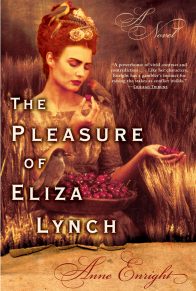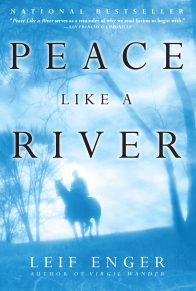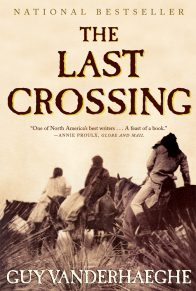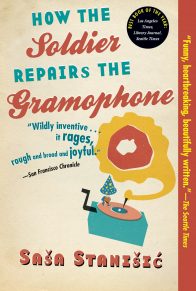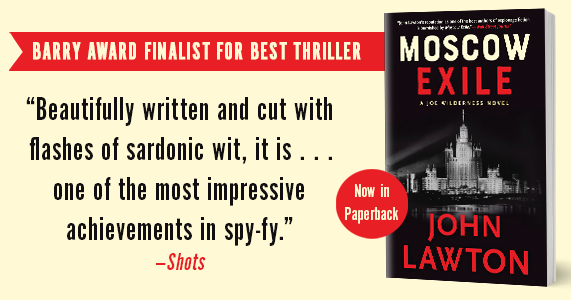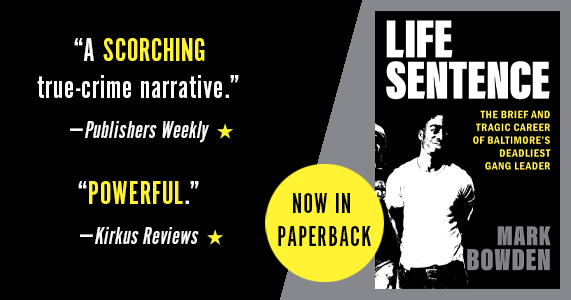The August sun shone like Jesus, and across the road, large black flies worried the thin dogs and cats that stepped among the rubbish or leapt on to the garbage drums. At midday, sweating shopkeepers pulled down their shutters, went home to have lunch and rest, and the afternoon slump set in. People and plants wilted together; only the pine trees remained upright, like soldiers, in the heat. Dust rose and settled whenever a car chugged slowly uphill, cats and young women yawned, and the town waited for the shadows to grow long.
I didn’t want to be alone in the house with Papi, so I stayed on the porch that ran three-quarters of the way round the building. I slid down to the floor and sat with my back to the wall.
Mami always said that time passed quickly, and maybe it did in other places—in Beirut or on the beach or in the Roman temples at Baalbek that were in our history books at school, or at the top of the snowiest mountain—but here in Ein Douwra, it went slowly.
The Rose Man came down the stairs onto the far end of the porch, smiled at his roses as he walked past them, and carried on up the hill, easing himself from foot to foot, lifting and settling his stick, stopping at every fifth or sixth step to rest and look around. He was slow, and time moved even slower than he did. It had taken for ever to get to 1981, and would take for ever again to reach my eighth birthday.
Finally there was a crunch of gravel and Mami appeared, sweating and red-faced, weighed down with bags of shopping. Naji came behind, carrying two more and stamping his feet in time to a song he was chanting. He followed Mami into the house, and a minute later came back out again. “What happened to you?” he asked, looking at my cuts.
I turned first one way and then the other to show Naji the best ones.
“What happened?”
“I fell down that ledge in the forest, the steep one.” I pointed the short distance down the slope to where the trees were singing, their chirps stitched together in an endless row. The forest was the best place to be, with its green pine needles and grasses, its brown trunks and rock, its bright coloured flowers, gleaming insects, thorn bushes, and the dry red earth of its narrow paths. “The skin tore as I slid down. There are still bits of grit in, see?” I poked at the black specks on my knee.
Naji’s eyebrows rose as if he didn’t believe me.
“I did! I tried to get hold of some roots but I couldn’t.”
“What was at the bottom, if you fell?”
“There were all sorts of things—twigs, a rusty can and pine-cones.” My fingers still smelt of the young cones that had been hard and green with a silver diamond on each scale. “And then I found . . .”
His eyes lit up. “What?”
“Nothing. When I got back and you and Mami weren’t here, I went to Teta’s, and she touched me all over to check that every bit of me was still there. It tickled! And there was blood on my shirt from the cut on my shoulder. It looked like a flower—it got bigger . . . like a rose!—and then Teta put spirit on my scratches, which hurt even more than falling over.”
But Naji was two years older than me and wasn’t interested in such things. He went inside. When he came back he was carrying a Matchbox car, his bag of marbles and the blue tin box that lived on the top shelf of his bookcase where I couldn’t reach. He kept his most precious things in it.
“Teta said it was the Virgin who stopped me dying when I fell.”
He stroked the little white sports car. “It’s a Lamborghini. Look.” He flicked the doors so they opened upwards, then closed them again.
“Do you think it’s true, Naji?”
He ran the car quickly across one palm so the wheels whizzed. “No. The Virgin Mary’s not here at all. Didn’t you hear how they saw her in a building site in Beirut?”
“Who saw her?”
“Just people. Gabriel’s mother told us. She said miracles were happening just twenty kilometres down the road from here in Beirut.”
“But Teta doesn’t lie.”
He shrugged.
A rumble of shelling was coming from somewhere as Naji emptied his pockets to see if there was anything precious to add to the box. There was a long piece of string with knots tied in it, his old penknife, a little block of wood with a hole bored through it, a round of caps and some more marbles.
“I’ve got a marble too,” I said.
Naji’s black eyebrows lowered. “Where is it? When did you get it?”
“Today. I found it.” It was still in my pocket, warm from being against me all afternoon. “Here!” I plopped it into his hand.
He gasped. The glass eye jumped up and down twice in his palm. I sat on my heels and laughed.
“Where did you get it?”
I told him how I’d found it in the forest, and he turned it over, examining it closely. It looked funny lying in his hand without a body round it, and I thought about people being made up of separate parts—ears and fingers, hair and bellybuttons.
“Do you think it’s hers?”
He glanced up. “Whose?”
“Hers!”
He peered more closely, as if it might have her name on it. “The witch?”
I nodded.
“Probably.”
Ever since we were old enough to think, we’d known she’d put a spell on Papi to make him the way he was.
“I know!” I cried. “It’s the evil eye!”
Naji looked doubtful. “Maybe.”
“She’s probably got more than one so she can swap them round depending who she wants to put the evil eye on. Big eyes for big curses and little ones for smaller curses—a drawer full, rolling about when she opens it!”
Naji sighed, which meant he didn’t think I knew anything. “There’s only one evil eye,” he said, “but if it is hers she can’t put a curse on us because we’ve got it.” His face lit up. “Like a miracle. Miracles are always happening.”
“What other miracles happen?”
He put the glass eye to his, maybe to find out if he could see with it. “Mar Sharbel.”
“What’s he ever done?”
“He’s our saint and there’s always stuff about him, how sick people get better.”
The sound of shelling, which was always in the background, came again, carried on the still air. “How?”
He waved his hand, as if there were too many instances to remember. “If they’re blind they grow new eyes, or new legs if they can’t walk.”
But we weren’t missing any legs, arms, eyes or even teeth.
We were only missing Papi.
Mami talked to herself—made noises, her face twisted, frowning or sad: the slight sucking in of breath when she cut herself, the annoyed “tut” when she was rolling up fatayir into parcels and the dough wouldn’t stick together, the “ach” when she straightened up from making beds, the long sigh, like the sea, when she sat down at the end of the day. She even talked to the chicken when she was preparing it for the oven, sympathetically as if she was sorry. And then there was the sound of her: the rustle of the underskirt against her legs, the clack of her wooden slippers, the tinkling of her two gold bangles, the click of her hips as she shifted from one foot to the other, the tiny tick when she bit down on hairpins while she was coiling her hair.
Papi was as quiet as a stone.
Perhaps Mami liked to cook because the kitchen talked back to her: the bubble and hiss of the pots, the crushing and chopping that came from the board, the clatter and tinkle of knives and glasses, the creak of the table, the whirr of the fridge, and the tlup-tlup-tlup of the dripping tap.
Naji must have left footprints when he left to go to Gabriel’s because the stretch of kitchen floor between the dining room and the porch door was newly cleaned and wet. I almost sent a tray crashing to the white-tiled floor.
“Be careful, ya Ruba!”
There were trays everywhere—along the counter and gas hob, on top of the fridge, on two chairs Mami had brought in from the dining room all covered with pastry dough.
“Why are you cooking so many?”
Mami’s face was red from the heat as she wiped her hands on a cloth. “They won’t make much in the end.” Sweat had settled on her upper lip, and she wiped it off with a downward sweep of her forefinger.
“Are they all the same?”
She nodded and started to roll out a new square. Then she lifted it onto her knuckles and, elbows spread sideways, stretched it so thin I could see her face through it. Three times it tore and had to be mended, but finally she cut it up and piled layers of dough on top of each other, brushing them with butter and sprinkling nuts as she went. Several ripped, and a ragged ball of useless skin-like pastry grew.
“Here—chop these nice and fine.” Flour smeared her face as she brushed her hair back with her arm.
It was hard to chop the pistachios. One flew up and hit the saint on the calendar that hadn’t been turned for two months. Another spun out onto the floor.
“Patience. Patience will extract sugar from a lemon.”
I rolled a nut between my fingers. “How?”
But she didn’t answer. Two trays came out of the oven and two more went in, the layers of filo, like dragonfly wings, that crackled when I touched them.
Mami wasn’t taking any notice. She was arranging more pastry on a tray. She was bent low and her hair was like a giant snail sitting on the back of her head. Then, as I stepped up close, her eyes widened. “Ruba, what happened?” A loose strand of her hair tickled my cheek as she leant down, her eyes round and black-rimmed. The light from the window showed specks of flour floating next to her ear in the thick heat.
“I fell. It’s all right, Teta put spirit on them,” I explained.
She checked me quickly, then carried on working and moving among the jigsaw puzzle of trays. The green of her dress was dark under the armpits, and her arms wobbled in the heat from the oven.
From the living room came the faint tack-tack-tack of Papi’s worry beads passing through his thumb and finger one by one, again and again and again.
“Mami, why do you cook all the time?”
“It keeps my thoughts busy.”
“Is that why you didn’t notice my cuts?”
She looked worried. “Yes.”
After the cooking came the washing. Then the clothes were hung out on the porch and Mami watered the fuchsias, marigolds and geraniums set out against the walls. She flickered in and out of the sun as she passed behind the hanging clothes, and water spilled out dark from the bottom of the pots. Mami was good at taking care of things, at making sure they had enough food and water. Thin streams slid across the porch and into the gutter. They oozed out from the bottom of every pot except for that of the leaning cactus tied to a pole that stood alone in the corner. Mami didn’t like it and kept hoping it would die, but it wouldn’t. She didn’t want to throw it away, but she didn’t want to water it either. Perhaps her heart had dried out and withered in the heat like a fig. For a moment I pictured it, purple and shrunken, inside her chest. “Mami, when will you water the cactus?”
She glanced over her shoulder. “I don’t know. Soon.”
“How soon?”
The plastic washing-line creaked but there was no answer. She gave the last few drops to the fuchsia, while further along the wall, the earth round the cactus stayed cracked and hard.
Papi watched silently from his armchair as I crossed the living room, his large dark eyes fixed on me; except for them, he didn’t move. A woman was singing out of the little radio he kept on the shelf near his chair.
“They put up roadblocks,
They dimmed all the signs,
They planted cannons,
They mined the squares.
Where are you, love?
After you we became the love that screams.”
I found a book and sat on the sofa. Above my picture of Ali Baba with the forty thieves, Papi’s face looked even more square than usual—a big brown square but for the funny reddish mark on his forehead, like shoe polish, that I had always wanted to rub off. And all the time, the tack-tack-tack of his worry beads.
The woman was still singing—”It is the second summer, the moon is broken“—and Papi was staring at the cuts on my legs.
“I fell, that’s all. It didn’t hurt much.”
There were black hairs on his arms where the shirt was rolled up, on the backs of the hands and above each knuckle; and below that, on his toes in their black leather slippers, on the big ones and the smaller ones lined up in a neat row beside them.
“You must be careful.”
” . . . O love of days, they will come back, Beirut, the days will come back . . .”
The reddish mark over his eyebrow seem bigger now. It reminded me of what Soeur Therese had said last time she came in to school to teach us about God and the Bible, watching through her glasses with eyes that saw everything, ready to use the telling-off voice that came straight out of her nose. She talked about Cain and Abel, and how the bad brother had a mark on his head.
In the vase on the table the plastic flowers were dusty, and the smell of burnt pastry hung in the air. Papi had turned into a statue with its eyes fixed on the floor. When he lifted his head again he seemed surprised that I was still there. As I left, it came to me that he was like the cactus. He sat in the corner all hard and dry, as though someone had forgotten to water him.






